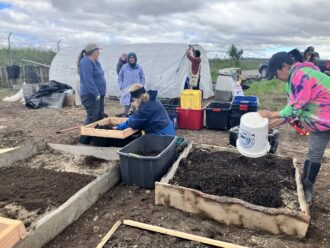A large nonprofit with a long history in Alaska, the Rural Alaska Community Action Program (CAP) is well-known for its work addressing housing, workforce development, and health challenges. When COVID hit, the organization added food security work to their priorities. With the Coronavirus Aid, Relief, and Economic Security (CARES) Act funding, they initiated ten food security projects around the state.
As a disproportionate number of rural Alaskans live in poverty and experience food insecurity, Rural CAP’s Growing Rural Opportunities for Wellness program (GROW) requested Western SARE funding to expand on these food security projects and lead a Bering Strait Ag Leader’s Summit. They are creating a network of agricultural professionals in rural Alaska, spreading sustainable agriculture practices to stimulate food security and employment.
“With the CARES Act funding, we appreciated the opportunity to collaborate with different communities’ programs. Yet we found the demand for funding these programs exceeded what we could offer. We learned from our connections in the Bering Strait the importance for ag training there,” says Gardening Program Specialist Emily Becker.
With the SARE funding, the Bering Strait Ag Leaders' Summit provides training to 12-15 ag professional leaders from seven different communities in the Bering Strait region of Alaska each year. Participants will convene in hands-on workshops to learn about sustainable agriculture practices and pass knowledge to their communities.
“Communities have reached out to us with specific needs, and we have tried to help them find resources. In every village we visited, people would talk with us about their history of local gardens – what they grew such as rhubarb and potatoes – and how that practice had faded. Residents still have the knowledge of how to use local resources for growing food, and we are trying to work with leaders to revive gardening practices. The pandemic made the need to return to community gardening even more obvious as 95% of food in Alaska is imported, and the villages currently rely on subsistence hunting, fishing, and gathering,” states Becker.
One such local garden is the Unalakleet community garden. Subsistence is a large part of their culture, and fresh produce is scarce.
“Gardens have a large role in our history,” says founder Cassandra Tikasuk Johnson, “at one time growing enough produce for the Bering Strait region. But, while there are currently some home gardens, the large gardens declined. Returning to large community gardens increases our food sovereignty and food security.”
Johnson and the Unalakleet Community Garden hosted the first annual Bering Strait Ag Leaders' Summit in July 2024. This in-person workshop, with fifteen gardeners representing seven communities, promoted sustainable, long-term local agricultural education. Through the workshop, Bering Strait community ag leaders learned and implemented principles and practices of sustainable agriculture, including using local resources such as kelp for soil creation, harnessing the waste stream and other local resources for soil amendments, and using simple technologies for warming soil to extend the growing season.
Becker notes “We do a lot of distance education in Alaska, but there is no replacement for in-person education. They all developed great friendships and professional relationships. This workshop marked a significant step toward enhancing local food production and sustainability practices in Bering Strait communities. The participants left not only with new skills and knowledge, but also with a strengthened sense of community and support for their agricultural endeavors.”
View Related SARE Grant:
- Bering Strait Ag Leaders' Summit (WPDP24-023)
